Serhii Narodenko, the founder and head of the Chernihiv newspaper “Visnyk Ch” purchased a generator for the editorial office, an uninterruptible power supply for the main computer, and encouraged his colleagues to stock up on insulation materials even before it became mainstream.
“Visnyk Ch” a modern Ukrainian newspaper, currently maintains a print run of 26,500 copies, down from 34,000 before the full-scale war. The reduction in circulation is mainly due to the rising cost of paper, with Russian-made paper disappearing from the market. The editorial team now sources European paper. The owner doesn’t view the circulation reduction as significant, particularly during wartime. What matters most is that the newspaper is back in the hands of its readers.
Despite ongoing shelling on the border of the Chernihiv region with hostile countries, postal workers have been heroic in ensuring the newspaper reaches subscribers. They even organized subscriptions for the newspaper for the next six months.
Chernihiv residents endured blackouts, heating and water supply disruptions, and communication breakdowns in March, as the city was under siege for over a month. Narodenko’s family left for the West on February 18, while he faced the war at home. The first issue of “Visnyk Ch” during the war arrived from a Kyiv printing house on the very first day of the conflict but reached readers only on May 12, as it was delayed during the postal expedition.
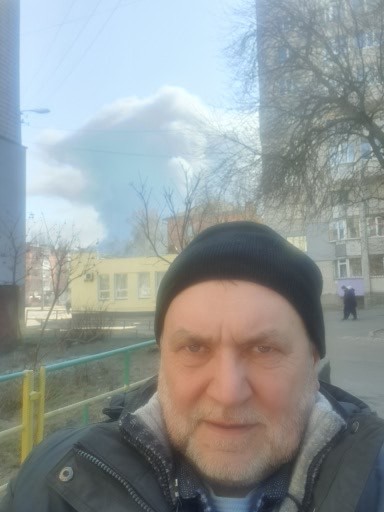
On that same day, the journalists returned to work following a tense period due to the war. They had to make adjustments to the newspaper’s format because of the soaring paper costs, reducing the number of columns from the pre-war 16 to just eight. This change lasted for six months but come December, “Visnyk Ch” expanded to 12 pages. They also had to cut one proofreader and one typesetter position, resulting in reduced incomes for journalists, as their pay is linked to the amount of work they produce. Currently, there are seven journalists on the team, with only five actively working, while two are on maternity leave. The subscription price was increased to 190 UAH for six months.
Let’s rewind to February 24. At the editor’s request, the editorial team had already halted their work. Serhii Petrovych, accompanied by his father-in-law and fellow townsfolk, headed to a supermarket to stock up on supplies. The provisions they acquired sustained them through the coldest days of early spring, ensuring they didn’t go hungry. However, it was February 25 that left a more vivid impression on Serhii Petrovych.
— On the 25th, I had a 15-minute conversation with a Russian sabotage and reconnaissance group, — recalls the journalist. — To my shame, I didn’t recognize them and spoke to them as if they were fighters going to defend Ukraine. I only realized this when they left. It happened near a store where there was a line. A small, inconspicuous car pulled up, and three people with rifles, dressed in new Ukrainian uniforms, got out. One went into the store and, with our Chernihiv accent, asked if it was possible to skip the line. Everyone said, ‘Go ahead, go ahead!’ The second one stayed by the car, and the third went about 70 meters away as if to smoke and stood watching. I approached the one next to the car, inquiring about the situation… Only when they left did it occur to me: soldiers were saying they had been fighting for three days when, in reality, the war had only been going on for two days. And their uniforms were brand new. A week later, there was an announcement from the SBU [Security Service of Ukraine] about the infiltration of around 30 sabotage and reconnaissance groups composed of Belarusian mercenaries – contract soldiers from the Russian army.
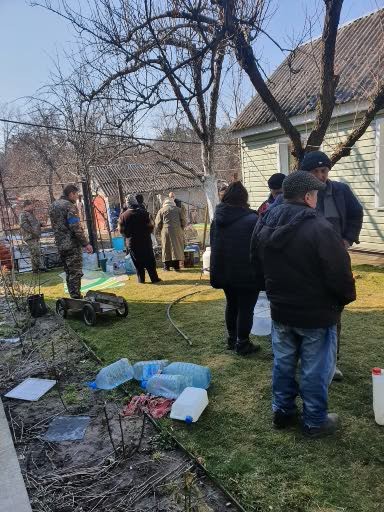
Crazy Nightly Shelling: They Survived, and Fear Disappeared
The family first felt immediate danger when the shelling began hitting the apartment buildings on the outskirts, where Narodenko’s eldest daughter lived. She took her children and moved to her father’s private house, where they planned to use a small basement as shelter.
— We believed everything would be fine, but it took a dark turn, — recalls the editor-in-chief.
— We were living relatively peacefully until the late evening of March 5. That night, between 22:50 and 23:00, a relentless barrage of shells struck my street. The road took a direct hit, and, despite being an atheist, that moment changed my perspective. Remarkably, despite the tight housing layout, all the shells hit the road, causing the explosions to ascend. It disrupted all utilities – no water, gas, electricity, or communication until the siege’s end. While buildings sustained damage, it wasn’t severe. The cacophony was deafening… My father-in-law and I sought refuge in the basement during the shelling. When it finally subsided, we ventured out. It was bitterly cold, dust and darkness surrounded us. I collapsed on the couch, covered in four blankets, and fell into a deep sleep.
Serhii Petrovych slept soundly until early morning, awakened by the crowing of the first roosters. As he peered out of the window, he exclaimed in shock. A neighbor’s house had lost its roof, and another had shattered windows. A fragment of a fence dangled from a tree. While some buildings had survived, they were coated in clumps of earth, resembling clay hedgehogs. Considering how close the shells had fallen, the next one should have hit Narodenko’s house directly, but inexplicably, it missed him.
— To be honest, after that, I stopped being afraid altogether because there was nowhere closer for the shells to fall, —Narodenko admits.
Throughout March, the city was constantly bombed by airplanes and shelled with artillery, but there were no more close calls like that.
Car for Defense, Generator for Himself and Neighbors
Five of the twenty regular and part-time employees of “Visnyk Ch” remained in the city; the others relocated to different regions of Ukraine or abroad. Postal services were non-operational, and the newspaper’s publication was halted, resulting in no salaries. When the opportunity arose to charge phones and mobile internet became accessible, the editor-in-chief contacted colleagues to check on their well-being and provided financial support to their bank accounts. Bank queues were long, but cash withdrawals were still possible in the war-affected city – only “live” money was accepted.
After the shelling and the loss of modern comforts at home, Narodenko moved to an apartment in the city center. There, they miraculously had gas and occasional electricity, although it was still as cold as elsewhere. From that point on, the chief editor learned how to heat an unheated living space: boiling water, pouring it into plastic bottles or hot water bags, placing them in bed, and then hugging them for warmth. The water should be hot but not boiling to avoid melting the plastic.
Every three days, Narodenko visited his house, running a gasoline generator. This allowed people from the area to charge their devices and collect water from the supply. This was their lifeline because volunteers couldn’t reach them. Some neighbors contributed gasoline for the generator.
— About 30-40 people gathered at my place with various containers, — Serhii Narodenko says. — They filled up with 100-300 liters of water and charged their phones at the same time. My generator hummed for an hour and a half, and I even managed to heat up the boiler – in the cold, I undressed and rushed under hot water.
The chief editor offered his car for defense purposes. After two months of enduring battles, the fighters returned it in damaged condition, which he understood. The journalist’s second car, parked in the yard, was peppered with shrapnel, bearing seven holes. He had to use it for transportation in Chernihiv until the local auto repair shop resumed operations.
When asked about his emotional coping mechanisms, Serhii Narodenko mentioned that he didn’t do anything particularly special. However, his journalistic curiosity played a crucial role: he frequently ventured outside, strolled through the streets, and observed people’s behavior. He found it remarkable how individuals reacted differently to explosions; some would drop to the ground and stay there, while others remained unfazed. The journalist also observed how residents dealt with daily life, including their interactions with shopkeepers, especially when it came to obtaining bread. In his rare moments of communication, he connected with colleagues, his wife, and children who had left the country. Additionally, he immersed himself in reading, making it through a quarter of a 32-volume contemporary detective anthology. An e-book with built-in lighting became an invaluable companion during this time.
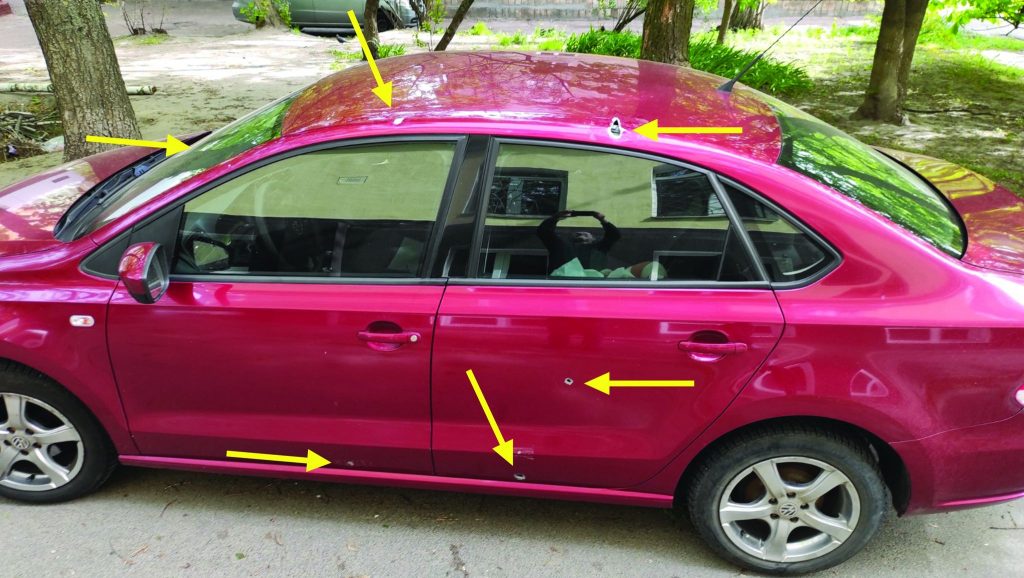
Office Generator, Gas Heater, and Super Warm Pants
After everything he had endured, the chief editor of “Visnyk Ch” came to a conclusion: the worst thing was the cold. He explained that if there’s no warmth, especially during freezing weather, for even three days, and a person isn’t prepared for it, it’s terrifying. During the interview, he showcased his exceptionally warm clothing that he had stockpiled during the summer at a specialized clothing store. The journalist refers to this attire as “extreme day clothing.
— Do you see what this is? These are insulated pants, up to the chest,— he pointed out. — The cold won’t get through. I also have a jacket like this. At home, I have an electric blanket – it can provide warmth, but only if there’s electricity. I have a Japanese gas heater and a canister of gas. In other words, a triple backup. At work, I said that if it gets cold, everyone should have insulated overalls. It’s incredibly cheap and very effective, — he explained.
Furthermore, the editorial leader had taken steps long before the regular power outages across the country to ensure the office had autonomous power. They had purchased a generator, and everyone in the office had learned how to roll it out onto the porch and start it up. They also acquired an uninterruptible power supply for the main computer, which could provide power for up to 10 hours.
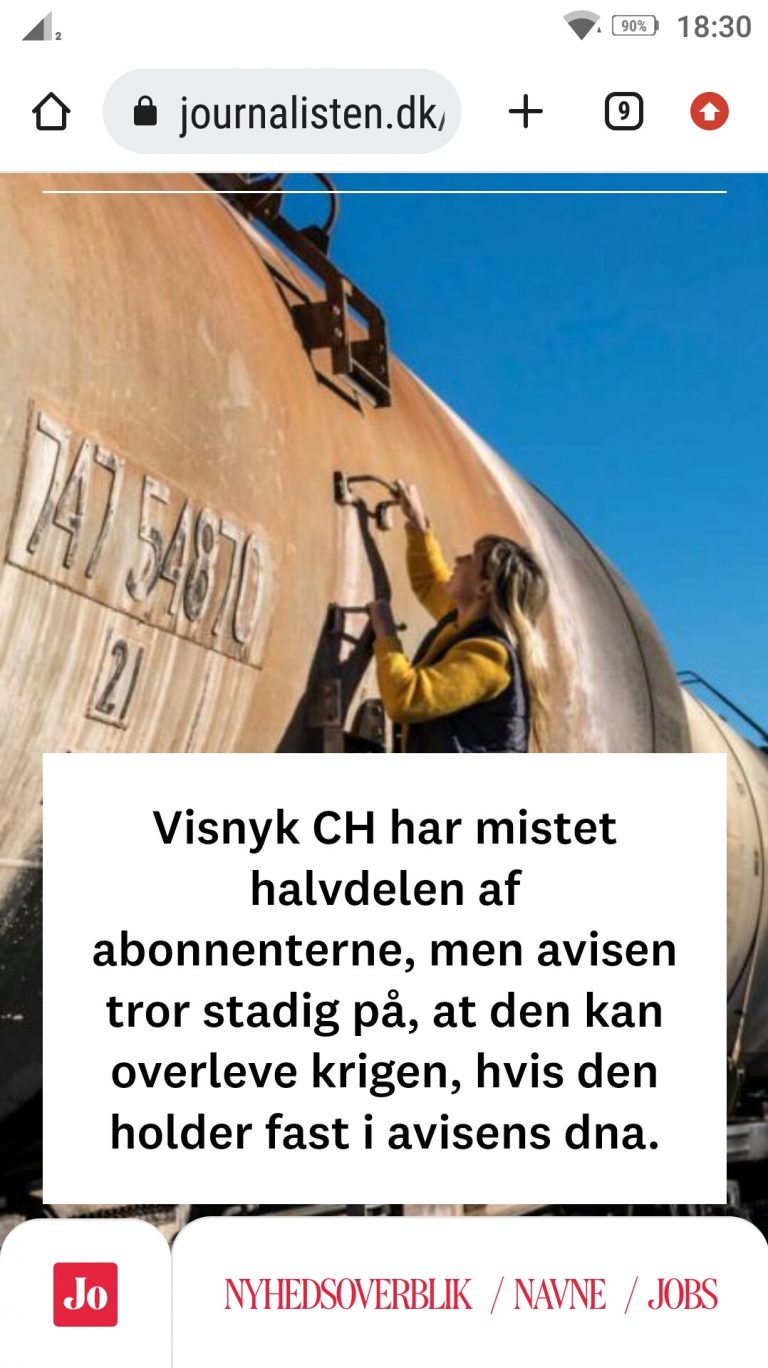
War Stories of Unyielding Chernihiv Residents
Preparation for winter is the second most crucial topic covered by “Visnyk Ch” journalists. The first revolves around life in the Chernihiv region territories that were occupied in the spring, featuring remarkable tales of resilience from both military personnel and civilians.
One such remarkable story is that of Mykola Kulinchuk, a Chernihiv region resident, who, in March, miraculously survived being shot and buried alive alongside his two deceased brothers. He managed to escape from the grave, sought refuge in a nearby village, and eventually embarked on a 40-kilometer journey back home. While his story gained attention from various media outlets, “Visnyk Ch” was the first to bring it to light.
— Despite everything, our team continues to work steadily and upholds the principles of independent and objective journalism, which our readers value,— proudly emphasizes the chief editor. — We focus on our own materials, which are often ‘borrowed’ by other local and nationwide publications, but that’s okay…
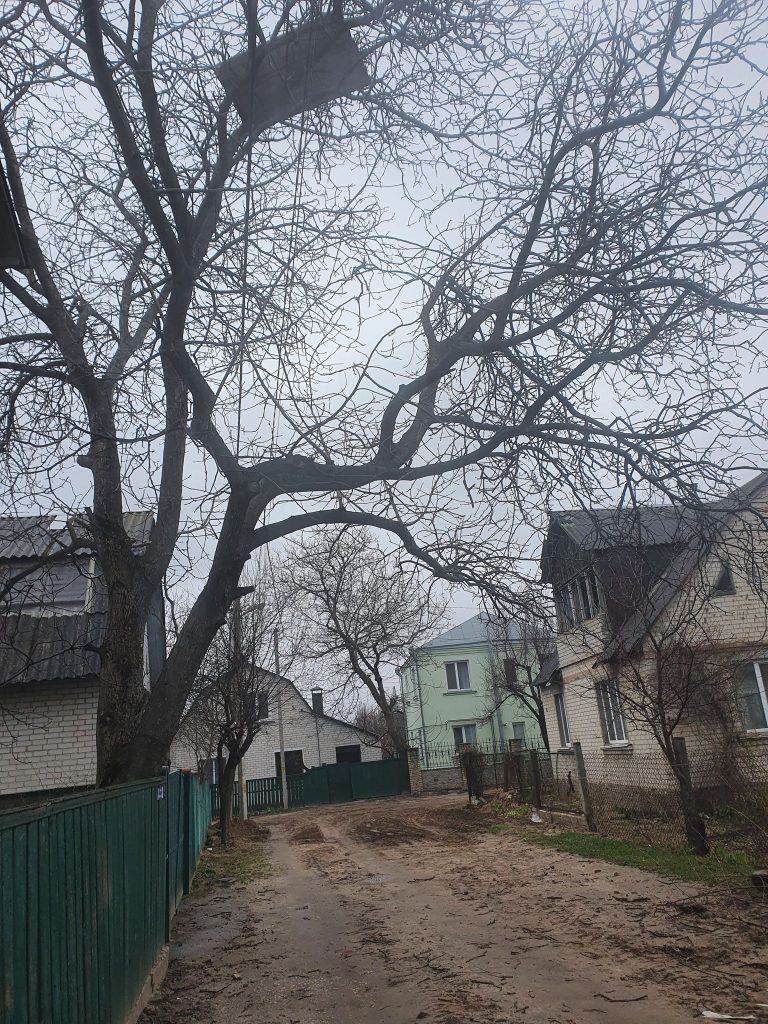
Smiling Amidst the Ruins
“Visnyk Ch” known for its commitment to classic journalistic values like seeking exclusives, reporting from the scene, gathering primary information, and rigorous fact-checking, recently gained international recognition through an article on the Danish website journalisten.dk. This online platform covers media work worldwide. In November, their reporters joined forces with journalist Yuliya Semenets, supported by the National Union of Journalists of Ukraine, for an assignment in the village of Volovyky on the Belarusian border. Yuliya was documenting how local residents survive by discreetly selling diesel fuel salvaged from bombed Russian tankers at the nearby railway station.
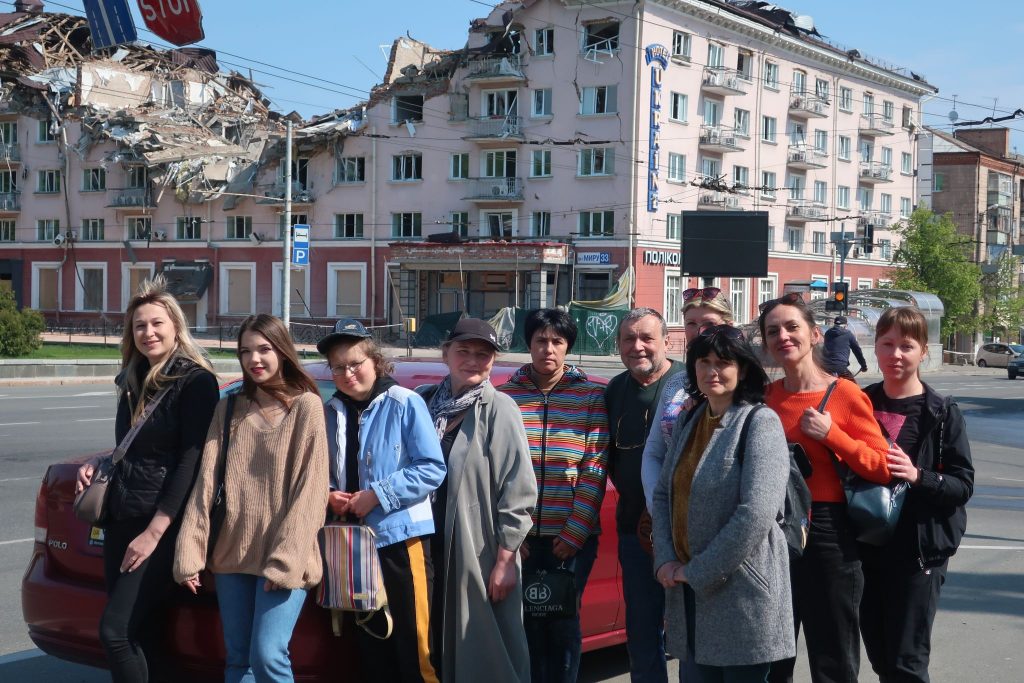
Having just resumed their work, the team of “Visnyk Ch” captured a photograph as a memento of the dramatic March. They posed optimistically in front of the missile-damaged “Ukraine” hotel in the very center of the city, smiling against the backdrop of the ruins.
This series, titled Executed Free Speech, is created as part of a project Drawing Ukrainian And International Audience’s Attention To Serious Violations Of Human Rights And Crimes Against Journalists And Mass Media By The Russian Federation, which is performed by the National Union of Journalists of Ukraine, with support from the Swedish non-profit organization Civil Rights Defenders.
JOURNALISTS ARE IMPORTANT. Stories of Life and Work in Conditions of War is a cycle of materials prepared by the team of the NUJU with the support of the Swedish human rights organization Civil Rights Defenders.
#CRD

 THE NATIONAL UNION OF
JOURNALISTS OF UKRAINE
THE NATIONAL UNION OF
JOURNALISTS OF UKRAINE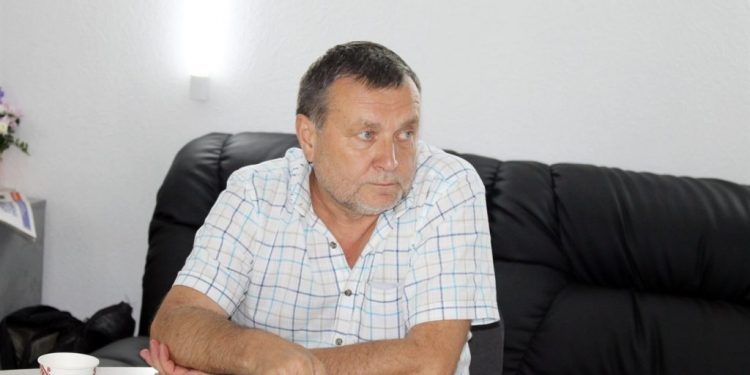
















Discussion about this post